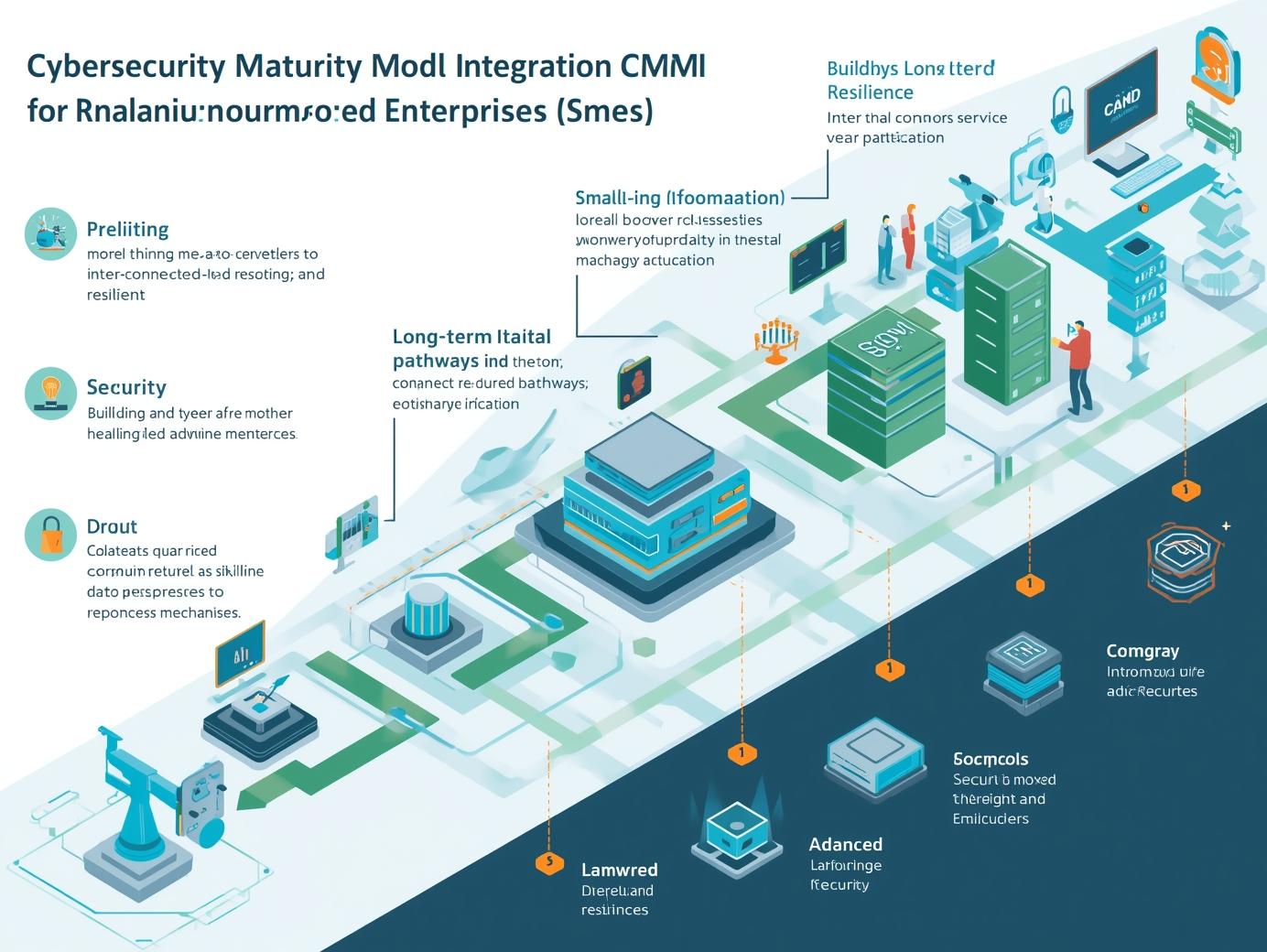
In an era where cyberattacks are increasing in frequency, sophistication, and financial impact, Small and Medium Enterprises (SMEs) face greater risks than ever before. Limited budgets, resource constraints, and lack of in-house security expertise often leave SMEs vulnerable to ransomware, phishing attacks, insider threats, and compliance failures.
This is where the Cybersecurity Maturity Model Integration (CMMI) becomes essential. Originally designed to evaluate the cybersecurity readiness of organizations, CMMI has evolved into a powerful framework that helps businesses—especially SMEs—measure their cybersecurity maturity, reduce risks, and build long-term resilience.
⭐ What is Cybersecurity Maturity Model Integration (CMMI)?
Cybersecurity Maturity Model Integration (CMMI) is a structured framework that assesses how well an organization identifies, responds to, and manages cybersecurity risks. It categorizes cybersecurity capabilities into maturity levels, enabling businesses to continuously improve their security posture.
✔ CMMI helps SMEs:
-
Understand current cybersecurity capability
-
Identify weaknesses and security gaps
-
Create a prioritized roadmap for improvements
-
Strengthen governance, compliance, and risk management
-
Implement standardized security processes
-
Build long-term cyber resilience
CMMI is not just a compliance framework—it is a strategic cybersecurity maturity model designed for continuous improvement.
⭐ Why CMMI Matters for SMEs
SMEs often believe they are “too small to be attacked,” but statistics show the opposite:
-
43% of cyberattacks target small businesses
-
60% of SMEs close within 6 months of a major cyber incident
-
Data breaches cost SMEs an average of $2.98 million globally
Implementing CMMI enables SMEs to adopt a proactive security culture instead of reacting after a breach.
⭐ CMMI Maturity Levels Explained (Simplified for SMEs)
CMMI consists of several maturity levels that show how advanced an organization’s cybersecurity practices are.
Level 1: Initial (Ad Hoc Security)
-
No formal cybersecurity policies
-
Reactive responses to threats
-
High risk of breaches
Level 2: Managed (Basic Security Hygiene)
-
Policies, procedures, and basic controls implemented
-
Regular patching and endpoint security
-
Initial risk assessments
Level 3: Defined (Standardized Security Processes)
-
Organization-wide security standards
-
Incident response plans
-
Advanced monitoring and access controls
Level 4: Quantitatively Managed (Data-Driven Security)
-
Security metrics and analytics
-
Automated threat detection
-
Vulnerability management workflows
Level 5: Optimizing (Continuous Improvement)
-
Threat intelligence integration
-
Predictive security analytics
-
Proactive security governance and resilience
SMEs can progress step-by-step through maturity levels, depending on their size, budget, and cybersecurity goals.

⭐ How CMMI Strengthens Cybersecurity for SMEs
1. Reduces Vulnerabilities and Cyber Risks
CMMI helps identify gaps in:
-
Network security
-
Access control
-
Endpoint protection
-
Data security
-
Cloud security
-
User awareness
This allows SMEs to patch vulnerabilities before attackers exploit them.
2. Enables Compliance with Global Security Standards
CMMI aligns with industry frameworks such as:
-
ISO 27001
-
NIST Cybersecurity Framework (CSF)
-
GDPR
-
PCI-DSS
-
SOC 2
This helps SMEs meet compliance requirements demanded by partners, clients, and government entities.
3. Proven Pathway to Build Cyber Resilience
CMMI establishes:
-
Strong governance
-
Robust controls
-
Incident readiness
-
Business continuity planning
This ensures SMEs can recover quickly and avoid long-term disruptions.
4. Enhances Customer Trust & Business Reputation
Clients prefer to work with businesses that demonstrate:
-
Security governance
-
Data protection
-
Risk management capability
A higher CMMI maturity level becomes a competitive advantage for SMEs.
5. Supports Scalable Security Implementation
As SMEs grow, their technology stack becomes more complex.
CMMI provides a scalable roadmap that grows along with the business.
⭐ How SMEs Can Implement CMMI: Step-by-Step Approach
Step 1: Conduct a Cybersecurity Maturity Assessment
Identify current gaps across:
-
IT infrastructure
-
Security tools
-
Governance policies
-
Incident response
-
Compliance frameworks
Step 2: Define Security Processes & Policies
Create policies for:
-
Access management
-
Data security
-
Endpoint protection
-
Backup & recovery
-
Cloud security
-
Change management
Step 3: Deploy Cybersecurity Controls
Implement controls such as:
-
MFA (multi-factor authentication)
-
EDR/XDR
-
Firewall and network segmentation
-
Vulnerability scanning
-
SIEM monitoring
Step 4: Build an Incident Response & Business Continuity Plan
Prepare for:
-
Ransomware attacks
-
System failures
-
Data breaches
-
Insider threats
Step 5: Continuous Monitoring & Improvement
Use analytics, threat intelligence, and automation to evolve security maturity.
⭐ Why SMEs Should Adopt CMMI Today
Cybersecurity threats are only increasing in complexity.
CMMI enables SMEs to:
-
Build long-term resilience
-
Reduce financial losses
-
Strengthen compliance
-
Improve operational security
-
Protect customer data
-
Establish a security-first culture
It is one of the most practical, cost-effective frameworks available for small and medium enterprises.
⭐ Why Choose Gigahertz Consultants for CMMI Implementation?
Gigahertz Consultants provides end-to-end security maturity and risk assessment services tailored specifically for SMEs.
✔ We Offer:
-
Cybersecurity Maturity Assessments
-
CMMI Implementation Guidance
-
Governance, Risk & Compliance (GRC) Support
-
Vulnerability Assessment & Penetration Testing (VAPT)
-
SOC Monitoring & Threat Detection
-
Cloud Security & Zero-Trust Design
-
Security Awareness Training for Employees
✔ Our Approach:
-
Industry-aligned frameworks
-
Customized roadmap based on your business
-
Cost-effective solutions for SMEs
-
Certified cybersecurity experts
-
Continuous monitoring and improvement support
We help SMEs build robust cybersecurity foundations that ensure long-term protection and resilience.
Conclusion
Cybersecurity is no longer optional for SMEs—it is essential for business continuity, customer trust, and long-term success.
By adopting Cybersecurity Maturity Model Integration (CMMI), SMEs can move from basic security hygiene to a fully optimized, resilient cybersecurity posture.
Gigahertz Consultants helps small and medium businesses assess their maturity, implement robust security controls, and build long-term cyber resilience through a structured, scalable approach.

Category: Cybersecurity
